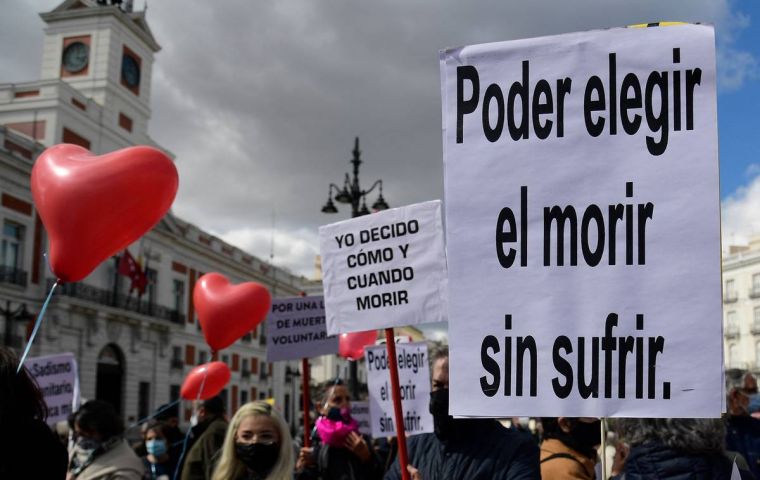MercoPress. South Atlantic News Agency
Euthanasia law in force in Spain pending Constitutional Court ruling
 Any person suffering from a “serious and incurable” disease may seek medical help to avoid intolerable pain.
Any person suffering from a “serious and incurable” disease may seek medical help to avoid intolerable pain. Spain has become the fourth European country where terminally ill patient can seek an assisted suicide treatment – or euthanasia- to put an end to their suffering.
Under the new law in force since last week, the two options are available: Euthanasia, when a medical team ends the life of the patient; and medically assisted suicide in which patients take the lethal drugs by their own hand.
However new these things may seem, Doctor Sigmund Freud's writings from the late 19th and early 20th centuries would describe a fatal dose of morphine whenever there was no more hope as common practice.
The new Spanish law “responds to the existing social demand on this issue” and features “guarantees” to limit the recourse to euthanasia, the Spanish Health Ministry said in a statement.
The new rule allows both euthanasias -when the medical team causes the death of the patient- and medically assisted suicide, that is, when the patient takes the dose of the prescribed product to end his life.
The text provides that any person suffering from a “serious and incurable” disease, or suffering from disabling chronic pain, may seek medical help to die and thus avoid “intolerable suffering.”
The person requesting the procedure must be capable and “aware” at the time of making the request, which must be formulated in writing and “without external pressure,” and renewed fifteen days later.
The treating physician may turn down the request if the medical criteria are not met, or raise a conscientious objection. The request must also be approved by a second doctor and then submitted to an evaluation commission.
Spain has become the fourth European country to decriminalize euthanasia, after the Netherlands, Belgium and Luxembourg, but the rightwing Popular Party has filed an appeal before the Constitutional Court.
The law authorizing euthanasia in Spain came into force last Friday, making the country one of the few in the world to allow a patient suffering from an incurable disease to die to put an end to suffering from it.
Outside Europe, euthanasia is legal in Canada, New Zealand and Colombia.
“The Constitutional (Court) now has in its hands the obligation to guarantee the right to life and the Government to develop a palliative care law that protects life, and that does not lead us to a slippery slope as has already been seen in the Netherlands,” said Rosana Ribera de Gracia, spokesperson for the NGO Right to Live.
In 2019, the Netherlands Regional Verification Commissions (CRVs) received 6,361 euthanasia notifications. This is 4.2% of the total number of people who died that year, which represents an increase of 3.8% compared to 2018, according to the Central Statistical Office of the European country.
“There is not a single piece of information that indicates that there is a slippery slope in the Netherlands, that is, that nobody's life is at risk. There has not been a single homicide, because doctors do not become executioners as the fundamentalists say,” according to Fernando Marín, of the opposing Right to Die With Dignity NGO.
Last week, the 77-year-old Françoise Hardy, a French iconic singer of the 1960s and early 1970s has expressed her wish to receive euthanasia due to throat cancer which causes her grave pain in addition to having left hear deaf of one ear.
“It's not about doctors agreeing to all requests. It is about reducing the unnecessary suffering of an incurable disease from the moment it becomes unbearable,” Hardy said.
Ironically, one of her greatest hits was called Comment te dire adieu (How to say goodbye to you).
Hardy claimed that “given my [little] notoriety, no one will want to risk being retired from practising medicine,” said the performer who also admitted helping her mother die with dignity: “My mother suffered from Charcot's disease (a group of inherited disorders that affect the peripheral nerves) and was fortunate to find a doctor who euthanized her with my help when she could go no further with this incurable disease,” she explained.




Top Comments
Disclaimer & comment rulesCommenting for this story is now closed.
If you have a Facebook account, become a fan and comment on our Facebook Page!